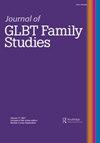阿巴拉契亚中部跨性别个体对产妇支持的认知
IF 2
Q2 FAMILY STUDIES
引用次数: 7
摘要
摘要跨性别者的心理社会体验是由影响家庭和社区互动的特定文化信仰和价值观塑造的。采用持续的比较方法进行主题分析,我们分析了对阿巴拉契亚中部25名变性成年人的深入采访,发现他们的母亲在他们的社会支持经历中发挥着至关重要的作用。参与者描述了与母亲的支持和不支持互动,以及母亲的态度和行为如何随着时间的推移朝着积极的方向发展。他们还认为,母亲在影响其他家庭和社区成员对他们的行为方面发挥了关键作用。参与者将母亲的行为置于强烈的文化价值观背景下,即不同的性别角色、家庭忠诚、宗教保守主义和自豪感,从而赋予母亲的行为以意义。这些发现提醒家庭心理健康从业者和卫生服务提供者直接评估家庭和社区的优势,并利用这些资源促进来自污名化和资源不足人群的客户的福祉。本文章由计算机程序翻译,如有差异,请以英文原文为准。
Transgender Individuals' Perceptions of Maternal Support in Central Appalachia
ABSTRACT The psychosocial experiences of transgender individuals are shaped by specific cultural beliefs and values that influence family and community interactions. Using a constant-comparative approach to thematic analysis, we analyzed in-depth interviews with 25 transgender-identified adults in Central Appalachia and discovered that their mothers play a crucial role in their social support experiences. Participants described supportive and unsupportive interactions with their mothers and how their mothers' attitudes and behaviors evolved in positive directions over time. They also perceived that their mothers played a key role in influencing how other family and community members behaved toward them. Participants gave meaning to their mothers' behaviors by placing them in the context of strong cultural values about distinct gender roles, family loyalty, religious conservatism, and pride of place. These findings serve as a reminder to family mental health practitioners and health service providers to directly assess family and community strengths and draw on these resources to facilitate the well-being of clients from stigmatized and under-resourced populations.
求助全文
通过发布文献求助,成功后即可免费获取论文全文。
去求助
来源期刊

JOURNAL OF GLBT FAMILY STUDIES
FAMILY STUDIES-
CiteScore
3.90
自引率
0.00%
发文量
0
期刊介绍:
The Journal of GLBT Family Studies is a much-needed resource on the working dynamics of the diverse family structures found in every corner of the world. This groundbreaking new journal addresses the vital issues facing gay, lesbian, bisexual, and transgender individuals and their families. Edited by Dr. Jerry J. Bigner, who has provided expert witness testimony in legal cases and in the litigation involving same-sex marriages in Canada, the journal features interdisciplinary studies and scholarly essays on topics related to GLBT family life and functioning as well as relationships with other families.
 求助内容:
求助内容: 应助结果提醒方式:
应助结果提醒方式:


